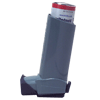Salamol General Information

Salamol (also known as Salamol) is used to treat wheezing and shortness of breath caused by breathing problems (such as asthma, chronic obstructive pulmonary disease). Salamol belongs to a class of drugs known as bronchodilators. It works in the airways by opening breathing passages and relaxing muscles. Controlling symptoms of breathing problems can decrease time lost from work or school.
Salamol is taken by mouth and does not work right away. It should not be used for sudden attacks of breathing trouble. Your doctor may prescribe a quick-relief inhaler for sudden shortness of breath/asthma attacks while you are on Salamol. Always have the quick-relief inhaler with you. Consult your doctor or pharmacist for more details.
How to Use Salamol
Take Salamol by mouth as directed by your doctor, usually 3 or 4 times daily. Dosage is based on your medical condition and response to treatment. Adults and children older than 12 years should not take more than 32 milligrams a day. Children aged 6 to 12 years should not take more than 24 milligrams a day.
Use Salamol regularly to get the most benefit from it. To help you remember, take it at the same times each day. Do not increase your dose or take Salamol more often than prescribed because your risk of serious side effects will increase.
Learn which of your medications you should use every day and which you should use if your breathing suddenly worsens. Ask your doctor what to do if you have worsening cough or shortness of breath, wheezing, increased sputum, worsening peak flow meter readings, increased use of your quick-relief inhaler, or if your quick-relief inhaler does not seem to be working well. Learn when you can self-medicate and when you should get medical help right away.
Salamol Possible Side Effects
Nervousness, shaking (tremor), headache, or dizziness may occur. If any of these effects persist or worsen, tell your doctor or pharmacist promptly.
Remember that your doctor has prescribed Salamol because he or she has judged that the benefit to you is greater than the risk of side effects. Many people using Salamol do not have serious side effects.
Salamol may raise your blood pressure. Check your blood pressure regularly and tell your doctor if the results are high.
Tell your doctor right away if you have any serious side effects, including: fast/pounding heartbeat.
Get medical help right away if you have any rare but very serious side effects, including: chest pain, irregular heartbeat.
Rarely, Salamol has caused severe (rarely fatal), sudden worsening of breathing problems/asthma (paradoxical bronchospasm). If you experience sudden wheezing, get medical help right away.
A very serious allergic reaction to Salamol is rare. However, get medical help right away if you notice any symptoms of a serious allergic reaction, including: rash, itching/swelling (especially of the face/tongue/throat), severe dizziness, trouble breathing.
Salamol Precautions
Before taking Salamol, tell your doctor or pharmacist if you are allergic to it; or if you have had a serious reaction to similar drugs (such as levSalamol, metaproterenol, terbutaline); or if you have any other allergies. Salamol may contain inactive ingredients, which can cause allergic reactions or other problems. Talk to your pharmacist for more details.
Before using Salamol, tell your doctor or pharmacist your medical history, especially of: heart problems (such as irregular heartbeat, angina, heart attack), high blood pressure, diabetes, seizure.
Salamol may make you dizzy. Do not drive, use machinery, or do any activity that requires alertness until you are sure you can perform such activities safely. Limit alcoholic beverages.
Before having surgery, tell your doctor or dentist about all the products you use (including prescription drugs, nonprescription drugs, and herbal products).
During pregnancy, Salamol should be used only when clearly needed. Discuss the risks and benefits with your doctor.
Salamol Possible Intercations
Drug interactions may change how your medications work or increase your risk for serious side effects. This document does not contain all possible drug interactions. Keep a list of all the products you use (including prescription/nonprescription drugs and herbal products) and share it with your doctor and pharmacist. Do not start, stop, or change the dosage of any medicines without your doctor's approval.